- Home
- Rabindranath Tagore
Chokher Bali Page 9
Chokher Bali Read online
Page 9
What kind of letter was this? Mahendra understood perfectly whose language this was. Like someone who faints from a sudden injury, Mahendra remained stupefied, holding the letter. Like a train travelling at full speed on a certain track until a head-on collision flings it off the rails, his mind seemed to lie overturned in an inert heap.
After thinking for a long time, he read the letter again, two or three times. What had been a distant hint so far now seemed to take clear shape. The comet that had appeared like a shadow in the corner of his mind’s sky, today assumed gigantic proportions as its tail shone in lines of fire.
This letter was indeed Binodini’s. The simple minded Asha had inscribed it, thinking it to be her own. As she wrote the letter composed by Binodini, thoughts arose in her mind that had never occurred to her earlier. The words she copied penetrated her mind from outside, implanting themselves in her heart and becoming her own. Asha could never have expressed her undefined anguish so beautifully. She wondered, ‘How did my friend understand my state of mind so exactly? How did she express it so perfectly in words?’ In her helplessness, Asha seemed to cling even more eagerly to her intimate friend, who possessed the words in which to express the pain in Asha’s own heart.
Rising from the chowki, Mahendra frowned, and tried very hard to feel upset with Binodini, but he grew angry with Asha instead. ‘Look at this! How foolish of Asha to torment her husband this way!’ He sat on the chowki and re-read the letter as proof of what he felt. In his perusal, he began to feel a sense of pleasure. He tried very hard to read the letter as if it had indeed been written by Asha. But this language was in no way reminiscent of the artless Asha. As soon as he had read a few lines, a joyous, intoxicating suspicion would fill his mind and spill over, like foaming liquor. This hint of love, indirect yet explicit, forbidden yet intimate, poisonous yet sweet, given yet withheld, roused Mahendra to a state of frenzy. He began to wish that he could stab himself somewhere in the arm or leg, or do something else to break the spell and to divert his mind. Banging the table with his fist, he jumped up from the chowki. ‘Away with it! Let me burn the letter!’ So saying, he carried the letter close to the lamp. He didn’t burn it, but read it again, instead. The next day, the servant had to dust a lot of ash off the table. But those were not the ashes of Asha’s letter; they were the ashes of Mahendra’s many incomplete attempts to answer the letter.
21
In the meantime, another letter arrived:
Why did you not answer my letter? It is for the best. The truth cannot be written down; I have sensed in my heart what your answer must be. When the devotee prays to the deity, does He answer in words? It seems this unfortunate woman’s prayer offering of wood-apple leaves has been granted a place at your feet!
But if the devotee’s prayer has disrupted Shiva’s meditation, please don’t be angry, lord of my heart. Whether you grant a boon or not, whether you open your eyes to see me or not, whether you are aware of my devotion or not, the devotee has no option but to offer her prayers. Hence, even today, I am writing this two-line letter to you. O my stone-hearted lord, please remain unperturbed.
Mahendra was again inspired to frame a reply. But when he tried writing to Asha, words addressed to Binodini appeared unasked at the tip of his pen. He was unable to write in a subtle, indirect manner. Having torn up many replies, and stayed up late into the night, he ultimately managed to frame an answer; but as he stuffed it into an envelope and was about to address it to Asha, he felt a whiplash on his back as it were. A voice seemed to say, ‘You villain, to deceive a trusting young girl in this way!’ Mahendra tore the letter into a thousand pieces, and spent the rest of the night seated at the table, burying his head in his hands, as if to hide his face from himself. The third letter said:
Can a person devoid of pride be capable of love? How can I offer my love to you, if I cannot protect it from neglect and insult?
Perhaps I have dared because I have failed to understand your state of mind. When you abandoned me, I still took the initiative to write to you; even when you maintained silence, I revealed my innermost thoughts to you. But if I have been mistaken about you, am I to blame? Try, once, to remember everything that happened, from beginning to end, and ask yourself, was it not you who led me to believe certain things?
Be that as it may, what I have written, whether true or false, cannot be erased; what I have given I cannot retrieve: such is my regret. For shame, that a woman’s destiny should subject her to such ignominy. But for that reason, don’t imagine that one who loves can endlessly debase herself. If my letters are not welcome, then let it be. If you do not answer, then this is where it ends …
After this, Mahendra could contain himself no longer. ‘I am returning home only out of extreme anger,’ he thought. ‘Binodini thinks it was to forget her that I ran away from home!’
It was to directly disprove Binodini’s arrogant assumption that Mahendra immediately decided to go back home.
At this moment, Bihari entered the room. Seeing Bihari, Mahendra’s inner rapture seemed to double. Before this, various suspicions had made him secretly jealous of Bihari; their friendship had grown strained. Today, having read the letter, Mahendra relinquished all his envy and welcomed Bihari with excessive emotion. Getting up from the chowki, he slapped Bihari on the back, and taking him by the hand, dragged him to an armchair and made him sit down.
But Bihari appeared dejected. Mahendra thought, the poor fellow must have met Binodini in the meantime and been spurned by her before coming here. Mahendra asked, ‘Bihari, did you visit my house recently?’
‘I am coming from there right now,’ replied Bihari gravely.
Imagining Bihari’s pain, Mahendra felt secretly amused. ‘Unfortunate Bihari!’ he thought to himself. ‘The poor fellow is completely deprived of female affection.’ He patted the area near his breast pocket once; the three letters rustled within.
‘How did you find everybody?’
Without answering Mahendra’s question, Bihari demanded, ‘Why have you left home to come and live here?’
‘I have frequent night duties nowadays; it’s inconvenient to stay at home.’
‘You have been assigned night duties before this, but I never saw you leave home for that reason.’
‘Do you harbour some suspicions in your mind, then?’ laughed Mahendra.
‘No, this is no joke; now let’s go home.’
Mahendra was already prepared to return, but hearing Bihari’s request, he convinced himself that he felt no urge to go home. ‘How is that possible, Bihari? Then my entire year at college would go waste.’
‘Look, Mahinda, I have known you since you were very young; don’t try to deceive me. What you are doing is wrong.’
‘Who is the victim of my wrongdoing, Mister Judge?’
‘Where is the large heartedness you have always boasted of, Mahinda?’ Bihari asked angrily.
‘It is currently at the college hospital.’
‘Stop, Mahinda, stop! Here you are laughing and joking with me, and there is Asha, in tears, wandering through the outer and inner chambers of your sleeping quarters.’
The mention of Asha’s tears was a sudden blow to Mahendra’s heart. His new intoxication had made him forget that others in this world also had their own joys and sorrows. Suddenly jolted, he asked, ‘Why does Asha weep?’
‘Is that something you don’t know? Am I supposed to know the answer?’ demanded Bihari, in fury.
‘If you must be angry that your Mahinda is not omniscient, then direct your anger at Mahinda’s Creator.’
Then Bihari narrated all that he had witnessed.
As he spoke, the memory of Asha’s tear-wet face pressed against Binodini’s bosom almost choked his voice.
Mahendra was amazed to see Bihari’s acute anguish. He knew that Bihari didn’t bother about matters of the heart, so when did he acquire this added quality? Was it the day he had gone to see Asha, the unwed maiden? Poor Bihari. Although Mahendra privately called hi
m poor Bihari, he felt amused rather than sad. Mahendra was certain in the knowledge that he was the single object of Asha’s devotion. ‘Those precious ones, coveted by others in vain, have voluntarily surrendered themselves to me forever.’ The thought made Mahendra’s breast swell with pride.
‘Very well, then, let’s go,’ Mahendra consented. ‘But you must send for a carriage.’
22
Like the lifting of a fog, all suspicions instantly evaporated from Asha’s mind at the sight of Mahendra’s face upon his return. Remembering her letters, she was too ashamed to raise her head and look Mahendra in the eye.
Mahendra rebuked her: ‘How could you write such accusatory letters?’ He extracted from his pocket the three much-read letters.
‘I beg you, destroy these letters,’ pleaded Asha. She tried desperately to take the letters from Mahendra’s hand.
Fending her off, Mahendra put them back in his pocket. He said, ‘I went to answer the call of duty, but you did not understand my intentions! How could you doubt me?’
‘Please forgive me this time,’ Asha begged, her eyes brimming with tears. ‘It will never happen again.’
‘Never?’
‘Never.’
Then Mahendra drew her close and kissed her.
‘Give me the letters; let me tear them up,’ implored Asha.
‘No, let them be.’
‘He is keeping the letters to punish me,’ thought Asha, full of humility.
This unpleasantness over the letters made Asha somewhat hostile towards Binodini. She did not run to her friend to celebrate the news of her husband’s arrival; rather, she seemed to avoid Binodini. Binodini noticed this and, on the pretext of work, maintained her distance.
‘This is very strange,’ thought Mahendra. ‘I had imagined that Binodini would be more visible this time, but it turns out to be quite the opposite! Then what was the meaning of those letters?’
Mahendra had decided that he would not try to fathom the mystery of the female heart. ‘If Binodini tries to come close, I shall still keep a distance,’ he had thought. But now, he told himself, ‘No, this is not going well. It’s as if something has really gone wrong between us. I should dispel this stifling cloud of suspicion by talking to Binodini in a natural, jovial manner.’
To Asha, Mahendra said, ‘It seems it is I who am your friend’s Chokher Bali, rankling like a grain of sand in her eye. One doesn’t get to see her at all these days.’
‘Who knows what is the matter with her!’ remarked Asha, indifferently.
Then, Rajalakshmi came to them tearfully. ‘It’s not possible to persuade Bipin’s wife to stay here any longer.’
‘Why, Ma?’ asked Mahendra, trying to conceal his shock.
‘Who knows, my child, but she is extremely insistent about going home now. You know nothing of the art of hospitality. Why would the daughter of a bhadralok, a girl from a genteel family, stay on in someone else’s house, if she’s not looked after and made to feel welcome?’
Binodini was sitting in the bedroom, embroidering a bed sheet. ‘Bali!’ called Mahendra, as he entered.
Binodini composed herself. ‘What is it, Mahendrababu?’
‘What a disaster! Since when did Mahendra become a babu?’
Fixing her lowered gaze on her embroidered bed-sheet once more, Binodini said, ‘What should I call you, then?’
‘The same name by which you address your friend—Chokher Bali.’
Binodini did not offer a witty retort as on previous occasions; she continued to sew.
‘So is that a true relationship, not to be ritually replicated with anyone else?’ Mahendra persisted.
Pausing for a moment, Binodini bit off some excess thread from the corner of her embroidery. ‘How would I know? You should know.’
Then, preempting any sort of reply to that, she asked gravely, ‘Why this sudden return from college?’
‘How long can one go on dissecting corpses?’
Again, Binodini bit off some thread and, without raising her head, she inquired, ‘Do you now require a live specimen?’
Mahendra had decided to enjoy his session with Binodini, laughing, joking and exchanging repartee in an extremely natural, easy manner. But he felt so weighed down with gravity that, try as he might, he could not summon up a light hearted reply. Seeing Binodini so rigidly remote today, Mahendra’s heart was drawn to her with great force; he wanted to shake the wall that separated them until it collapsed to the ground. Instead of offering a suitable retort in answer to Binodini’s verbal barb, he suddenly came and sat beside her.
‘Why are you leaving us?’ he demanded. ‘Have we wronged you somehow?’
Moving away a little, Binodini looked up from her sewing and, fixing her enormous, shining eyes on Mahendra’s face, she declared, ‘Everybody has duties to perform. When you leave everyone behind to go and live close to the college, is it because someone has hurt you? Must I not go as well? Don’t I have duties, too?’
Racking his brains, Mahendra could think of no suitable reply. ‘What urgent duties do you have that make it essential for you to leave?’ he asked, after a short silence.
Very carefully threading the needle, Binodini replied, ‘My heart knows where my duties lie. Why offer you a catalogue of my responsibilities?’
With a grave, thoughtful expression, Mahendra remained silent for a long time, gazing at the top of a coconut tree in the distance. Binodini continued sewing quietly. There was pin drop silence in the room. After a long while, Mahendra suddenly spoke. Binodini started at this sudden break in the silence, pricking her finger on the needle.
‘Will no amount of persuasion prevail upon you to stay?’ Mahendra asked.
Sucking the drops of blood from her injured finger, Binodini answered, ‘Why such persuasion? How does it matter whether I stay or go? What difference would it make to you?’
As she spoke, her voice seemed to grow heavy; bending her head very low, Binodini became deeply engaged in her embroidery; there seemed to be a hint of tears beneath her lowered eyelashes. Outside, the cold Magh afternoon was fading into the darkness of evening.
Mahendra impulsively grasped Binodini’s hand, and said in a choked, tearful voice, ‘If it did make a difference to me, would you stay?’
Binodini quickly pulled her hand away and moved further away. The spell was broken. The words Mahendra had just spoken began to echo in his ears like a terrible mockery. He bit his offending tongue, and fell silent.
Just then, into this room filled with silence, entered Asha. Immediately, as if in continuation of an earlier conversation, Binodini informed Mahendra, laughing: ‘Since you have flattered my self-esteem to such an extent, it is my duty to honour your request. Until you bid me farewell, I shall remain here.’
Delighted at her husband’s success, Asha embraced her friend. ‘So that’s decided, then. Now swear three times, that until we bid you farewell, you shall stay, stay, stay.’
Thrice, Binodini repeated her oath.
‘Dear Chokher Bali,’ said Asha, ‘if you ultimately agreed to stay on, then why demand so much persuasion? In the end, you had to concede victory to my husband.’
‘Thakurpo, have I conceded victory, or forced you to accept defeat?’ smiled Binodini.
All this while, Mahendra had remained stupefied; he felt as if his guilt had filled the entire room, as if his whole body was enveloped in shame. How could he speak to Asha in a cheerful, natural manner? How instantly transform his monstrous loss of control into a frivolous joke? Such demonic cunning was beyond him. ‘Indeed, the defeat was mine,’ he declared gravely, and immediately left the room.
Not long after, Mahendra returned. ‘Please forgive me,’ he begged Binodini.
‘What offence have you committed, Thakurpo?’
‘We do not have the right to keep you here by force.’
‘Where was the use of force on your part?’ smiled Binodini. ‘I did not notice any. You asked me affectionately, and in words that were pleasa
nt enough. Is that using force? Tell me, my dear Chokher Bali, are force and love the same?’
‘Never,’ declared Asha, in complete agreement.
‘Thakurpo, you want me to stay, you will suffer if I leave; this is my good fortune,’ said Binodini. ‘What do you say, Chokher Bali, how many such soulmates can one find in this world? If I am fortunate enough to find a friend who shares my sorrows and my happiness, why would I be eager to leave him?’
Upset at seeing her husband speechless and humiliated, Asha said, ‘No one can rival you in the use of words, my friend. My husband has acknowledged defeat, now please let matters rest.’
Mahendra hurriedly left the room again. Just then, following a short conversation with Rajalakshmi, Bihari came in search of Mahendra. Seeing him at the door, Mahendra declared, ‘Bihari, there’s no villain like me in this whole world.’ He said this with such force that his words carried into the room.
Instantly, from within, came the call, ‘Bihari Thakurpo!’
‘Binod Bouthan, I’ll come in a little while,’ answered Bihari.
‘Please come and listen to what we have to say!’ called Binodini.
As soon as Bihari entered the room, he shot a quick glance at Asha; the portion of her face that he could glimpse behind the covering on her head showed no sign of dejection or pain. Asha tried to get up and leave, but Binodini forced her to stay, saying: ‘Tell me, Bihari Thakurpo, do you have a stepbrotherly relationship with my Chokher Bali? Why does she want to run away whenever she sees you?’
Highly embarrassed, Asha nudged Binodini.
‘Because the Maker has not given me an attractive appearance,’ smiled Bihari.

 Selected Poems
Selected Poems The Lover of God
The Lover of God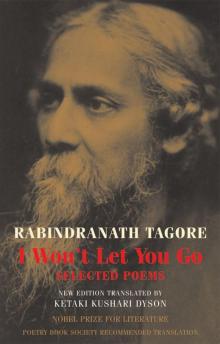 I Won't Let You Go: Selected Poems
I Won't Let You Go: Selected Poems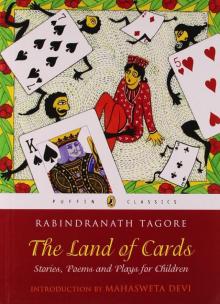 The Land of Cards: Stories, Poems, and Plays for Children
The Land of Cards: Stories, Poems, and Plays for Children The Tagore Omnibus, Volume One
The Tagore Omnibus, Volume One The Boat-wreck
The Boat-wreck Chokher Bali
Chokher Bali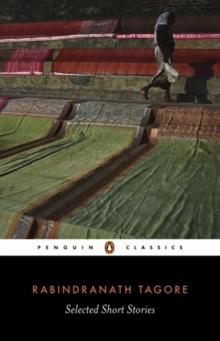 Selected Short Stories
Selected Short Stories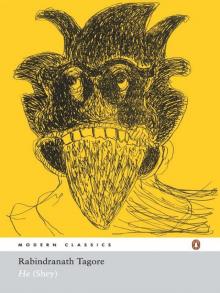 He (Shey)
He (Shey) Letters From a Young Poet 1887 1895
Letters From a Young Poet 1887 1895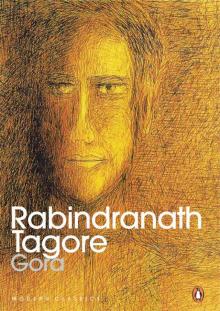 Gora
Gora Tagore Omnibus, Volume 1
Tagore Omnibus, Volume 1 Selected Poems (Tagore, Rabindranath)
Selected Poems (Tagore, Rabindranath)